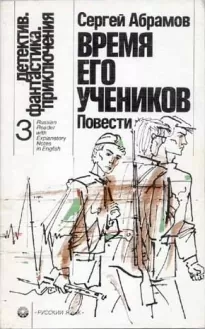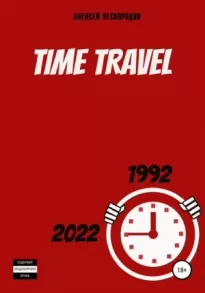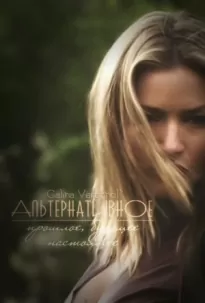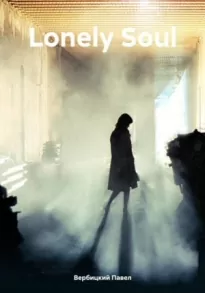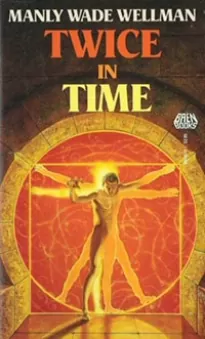Разговорный английский
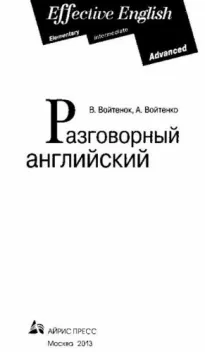
- Автор: Владимир Войтенок
- Жанр: Самиздат, сетевая литература
Читать книгу "Разговорный английский"
S. We are in for a non-stop flight, sir. If you feel hungry, you’ll be provided with a hot meal on the way.
N. Oh, that’s fine! And when can we have it?
S. As soon as we reach altitude. In the meantime you may read this booklet entitled “The ABCs of Jet Flight.” The reading light is above you. I hope you will enjoy the flight, gentlemen.
BOTH. Thank you.
9. TRAVELLING BY CAR
As for me there is nothing better than to travel by car — a good, fast car I mean. When you are in an aeroplane, you have to be driven by someone else; travel by car is a more personal experience, for there you can drive yourself. You just sit down at the wheel, switch on the motor, step on the pedal with your foot and off the car goes.
You can go as slowly or as fast as you wish, stop when and where you choose; you park the car on the side of the road (street), get out and go where you like.
It is quite true that driving a car has some disadvantages. In town it is rather a nuisance with all these traffic “jams” or “hold-ups”, roundabouts, detours and so on. It is not altogether pleasant when you ride on a bumpy road or get a flat tyre, or still worse, when you get stuck in the mud.
But what can be better than a spin in a car on a week-end with your friend? As soon as you get out of the crowded town and see the long wide road opening up before you, what a thrill it is to feel the car rush forward at a touch of your foot, to feel the wind in your face, to see houses, trees and people flash past, to feel the real joy of speed.
Then, of course, you see much more of the country than you do in a plane. Suppose you are on vacation and have decided to take a 700—800 miles’ trip down South in a car. What magnificent views you behold on your way — the cheerful fields, the road winding its way up the mountain with steep, grey cliffs on one side and a deep precipice on the other, the shining expanse of the sea wrapped in a blue noonday haze, the woods, the rows of acacia that stretch along the streets of the towns that you pass through.
Indeed your impressions are unforgettable.
10. A JOY-RIDE
GEORGE. Hello you, Tom!
TOM. George N.! My Lord! It’s you, isn’t it?
GEORGE. My very self. How do you do, Tom?
TOM. Pretty well. And how goes the world with you?
GEORGE. Getting along all right. I say, Tom, let’s go for a spin in the car.
TOM. In the car? What car?
GEORGE. We have bought a car.
TOM. You don’t say so!?
GEORGE. Really. Well? What about Saturday at, let’s say, 4 o’clock?
TOM. Why, that would be fine! And couldn’t we pick up Fred and Ann?
GEORGE. Why, yes! You’ll let them know, won’t you? I’ll bring, the car over to your place at about four then.
TOM. All right.
GEORGE. Well, here we are. Hello, everybody.
ALL. Hello, George.
GEORGE. Well, come on. Get into the car, all of you, ANN. I say, George, may I take the front seat?
GEORGE. Certainly! Well? All in?
TOM. Yes. Step on it1, George.
GEORGE. Where do you want me to take you to?
TOM. Get out of town on to the highway first.
FRED. Well, it’s fine, Tom, isn’t it? I say, George, what does the speedometer show?
GEORGE. Sixty.
FRED. Sixty miles an hour. That’s great!
TOM. What about taking to the right, George?
GEORGE. No. The road’s bumpy there. Last Sunday we got stuck somewhere near here.
TOM. An right. Go straight —. What’s that?
GEORGE. People call it a puncture.
ANN. A puncture? What are we going to do now? Shall we have to walk back all this way?
GEORGE. Don’t fret, Ann. Everything will be all right in two jiffies. Well, lads, we’ll have to be snappy. You, Tom, get the jack. Do you know what to do with it?
TOM. Yes. To lift the car, I suppose.
GEORGE. That’s right. You, Fred, get out the spare wheel. And you, Ann, go and pick flowers. In ten minutes we’ll be on the move2 again.
TOM (after some time). Well, George? Everything’s fixed up, isn’t it?
GEORGE. Yes. You go and call Ann. Put in the wheel, Fred, while I fill the radiator.
ANN. You were rather quick, lads. Which way are we going now?
GEORGE. Let’s go as far as N. and then go back.
ANN. Good.
GEORGE. Well? How did you enjoy the joy-ride? ALL. It was fine, George. Thanks very much.
GEORGE. Don’t mention it.
Vocabulary Notes
1 to step on it — давать газ
2 to be on the move — быть в движении
11. AT THE CUSTOM HOUSE
P. Will you examine my things?
O. Presently, sir, I will ask you to look through these lists in the meantime, please.
P. What lists?
O. The Prohibited Articles List1 and the Duty-free Quota List2. Here they are, please.
P. Thank you.
O. What have you to declare, sir?
P. I have nothing that’s listed in this first list.
O. What have you above the fixed quote?
P. Well, I didn’t get through the second list, you know. They are both rather long.
O. Will you, please, open your trunks, sir?
P. Yes, of course. Here you are.
O. What are these things?
P. They are for my personal use.
O. You have suits above the fixed quote, sir.
P. But they are not new.
O. All the same. You will have to pay duty on this extra one.
P. Well, all right.
O. Now, I see you have books.
P. Yes. Are they prohibited?
O. They’ll have to be looked through, sir. I’d ask you to put them aside, please.
P. What! Are you going to read them all?
O. No, our interpreter will just skip through them, that’s all. Now, what are these things?
P. Oh, only a few trifles for my family. Are they liable to duty, too?
O. No, these are not. Well. The examination is over, sir. You may pay the duty for the suit over there, please.
P. Yes. Thank you.
O. When you bring the receipt, I’ll stamp your luggage, sir.
Vocabulary Notes
Prohibited Articles List — список 2 Duty-free Quota List — спи- товаров, ввоз и вывоз которых сок предметов, разрешенных к запрещен беспошлинному ввозу
12. AT THE HOTEL
(Two fellow-travellers have just embarked from the train.)
A. Where do you intend to put up, Mr. B?
B. No idea. And you?
A. The last time I was here I stayed at (the) “Europe.” Let’s try our luck there. It’s a pity I hadn’t time to book a room beforehand.
B. Do you think we’ll get anything there?
A. Well, I hope we shall. The touring season is over now.
B. Well, here is a taxi. Hotel “Europe,” please.
DRIVER. Yes, gentlemen.
B. Here we are.
DESK
CLERK. What can I do for you, gentlemen?
B. We should like rooms — two single rooms or one two- bedded room. (To Mr. A.) Do you mind being together, Mr. A.?
A. Not in the least.
D-C. I am sorry, gentlemen, but we are all booked up. We are expecting a delegation.
B. No chance at all?
D-C. Sorry. W. have nothing at the moment.
B. You couldn’t possibly direct us somewhere?
D-C. One moment, gentlemen. 1’11 ring up the “Astoria.” Perhaps they can put you up there.
B. Please do.
D-C. In whose name shall I book it in case you are lucky.
B. Mr. Black, please. (The D-C. talks over the phone.)
D-C. Yes, gentlemen, they have rooms. Do you happen to know where the hotel is?
B. Sorry, but I don’t.
D-C. It’s in N. Street. Not far from the General Post Office.
B. Thank you. (To Mr. A.) Well, let’s go, Mr. A.
13. FIRST IMPRESSIONS OF ENGLAND
On approaching the harbour of Dover, you perceive a white stripe on the horizon that, the nearer you get, appears to rise out of the ocean. Of a sudden, a flash of sunlight settles on it, making it glitter like diamonds; it is the white chalk cliffs of Dover.
Before setting foot on English soil, every traveller, be he British subject or not, must show the landing ticket, which he gets on the boat, and which entitles him to land. On the landing-stage you say “goodbye” to your mother tongue and nationality, and try to be as English as you can.
All is hurry and bustle now. Porters carry your luggage to the custom-house, where it is examined by custom-house officers, who label or mark every piece of your luggage. Then you have to show your passport, and now — if found all right — you may go where you like. You take the train, called the boat-train, for London.
You fly past many stations, the names of which you are almost unable to make out, as they are printed on lamps and benches. The walls of English stations are covered all over with advertisements, giving them a rather gay appearance. After a two hours’ run through a country of green meadows you arrive at Victoria station, London.
Taxis in abundance are waiting on the platform just where you get off the train. What a panorama London affords when you see it (for the first time) from a taxi or the top of a bus! One might think that he is at the cinema, with fine motion pictures rolling on. Gigantic palaces, theatres, monuments, bright shops all aglow at night with neon advertisements, road streets with countless pedestrians hurrying to and fro, buses, trams, cars — an endless stream of traffic. The first glimpse of London amazes the visitor.
But if you want to see the life of the working people, you just step down from the top of the bus and go along the southern bank of the Thames. There you will find quite a different world — a world of poverty, unemployment and disease.
Crowding down to the water are rows of houses, dirty and dark, inhabited by countless thousands of poor folk, whose days are spent in unending toil and the struggle to keep alive. It is indeed difficult to imagine that at no great distance from the splendid broad streets, is St. Giles — the heart of the London slums.
XV. Post Office. Telegraph. Telephone. Letter Writing
1. BOOK-POST
A book-packet may contain any number of separate books or other publications, as newspapers, magazines, and the like, photographs, drawings, maps or any other substance in ordinary use for writing or printing upon. But a book-packet may not contain any letter or
communication of the nature of a letter, nor any enclosure sealed against inspection.
A book-packet may be posted either in a cover open at both ends so that the contents can be easily examined, or entirely covered. In the latter case the postmaster has the right to inspect the packet before it is sealed. For greater security of the contents, the packet may be tied up with a string.
2. PARCEL POST
At every Post Office there is a Parcel Post Service which deals with inland parcels and parcels sent abroad. The rate of postage for a parcel depends upon the weight of the parcel and the distance it is to be sent. The Parcel Post Service between our country and other countries is subject to various regulations.
Letters, book-packets and parcels may be registered with or without declared value. The fee for registration and insurance in each case is different. They also may be sent by air; again the fee in each case may be different.
3. MONEY ORDERS
You may send a money order by mail (a postal order) or by telegram (a telegraph order). The sum sent by mail or telegram is unlimited.
A postal order has to be delivered within a month, and a telegraph order within 24 hours. If a postal order is not presented for payment within one month (a telegraph order — in 3 days), the order is sent back to the sender.
4. TELEGRAPH
There are two types of telegram service in our country: ordinary and urgent. The tariff per word for telegrams abroad is higher. The address of the receiver is charged for, but not that of the sender, which, by the way, is written at the foot of the telegram form. You are not restricted in the quantity of words, but as you pay for every word you ought to know how to write a telegram omitting, as much as possible unnecessary words such as prepositions and the like.
Telegrams may be sent:
to be called for;
to be delivered to the addressee in person;
to be delivered to the addressee at an appointed time;
to be delivered by special delivery;
with (a) reply prepaid;
with (a) notification of delivery.
The latter means that the sender should be informed by whom and when the telegram was received.
5. AT THE POST OFFICE
ANN. Hello, Mary! Good afternoon, Mrs. Smith.
MRS. S. Good afternoon, Ann. (7b Mary.) Are you going out, Mary?
MARY. Yes, ma. We want to go to the cinema. Do you mind?
MRS. S. Not in the least. Couldn’t you possibly mail this letter? I don’t happen to have an envelope, otherwise I could have dropped it into the pillar-box.
MARY. Why, yes, ma! To John?
MRS. S. Yes. Here is his address. Have it sent as an ordinary letter.
MARY. All right, ma. (7b Ann.) Do you mind walking with me over to the Post Office?
ANN. Of course, not. I’d be only too glad. I shall be able to ask if there are any letters in my name there.
MARY. (7b clerk.) An envelope, please.
CLERK. Yes, young lady. Any stamps?
MARY. A three-halfpenny one, please.
CLERK. Here you are. Wouldn’t you like to have some nice picture postcards, young lady?
MARY. No, thank you. You might give me a shilling’s worth of stamps and some envelopes, please.
CLERK. Yes. Here you are. One and sixpence, please.
MARY. Thank you. (7b Ann.) Let’s go over to the stand. I shall have to write the address.
ANN. In the meantime, I’ll go over to the “Poste Restante” window and —.
MARY. Just a minute, Ann, and we’ll go over together. My! The envelope won’t stick! What’s to be done?
ANN. But you have some spare envelopes, haven’t you?
MARY. Oh, yes. I shall have to write the address all over again. ANN. It can’t be helped, I suppose.
MARY. Well, that’s done. Where is the letter-box here, I wonder? ANN. There it is. But say, Ann, you are not going to send it blind, are you?
MARY. Send what blind?
ANN. Why, your letter! You have forgotten to write the name of the addressee.
MARY. Indeed, I have. What a stupid thing I am. One moment, Ann. Well, it seems to be all right now.
ANN. Let’s drop the letter into the box first and then go over to the “Poste Restante” window.
7. TELEPHONE
GEORGE (To a passer-by.) Can you tell me where there is a call-box around here?
P. Let me see. There is a booth at — but no, that’ll be too far. Oh, I recollect now that there is one in N. Street. Do you know where N. Street is?
G. Sorry. I’m a stranger in this part of the town.
P. I’m going that way myself. You may come with me, if you wish.
G. Most willingly. Oh, too bad. I have forgotten my friend’s call-number.
P. There must be a directory in the booth. Well, here we are. Step in, please.
G. Oh, yes, here is the directory on the shelf. Thank you.
P. Don’t mention it.
G. I beg your pardon, but haven’t you a decent coin? Mine is too worn and battered; it doesn’t go into the slot.
P. I think I have. Here you are.
G. Thanks awfully.
P. That’s all right. Good-bye.
G. Goodbye. (G. puts a call through.) (This is) George speaking. I would like to speak to Tom, please. — Yes, I’m holding on. — Hello, (is) that you, Tom? — Yes, that’s me. How do you feel now? — That’s good. — Me? Well, I’m toddling along in the same old way. I say, Tom, suppose we go to the football match, eh? — Yes, I have. So, you don’t mind. — Now, where shall we meet? — That’ll suit me. And what about the time? — At six o’clock. But we must meet earlier — Five o’clock? Righto. Well, so long.
Fill in Toni’s part of the dialogue.
XVI. Seasons. Weather. Time
1. SEASONS
There are four seasons in the year — spring, summer, autumn and winter. Spring is the season of hope and happiness. It is the season when nature awakens from her winter sleep — the ice is broken, the grass is beginning to shoot, here buds are showing, there the trees are already bursting into leaf, fresh, green and lovely. Spring has come!
Summer is the hottest season in the year. The bright sunshine scorches the earth. Not a single cloud is in the sky. It is pleasant to get out of town where one is so oppressed with the heat and ramble through woods, among hills and valleys, following winding paths that are hardly seen to the naked eye in the thick green grass. The fields are green and shorn — here and there big stacks of hay are seen. The days are long in summer.
But on moves the earth in its race round the sun. The days are becoming shorter, the sun rays are losing their glittering force — autumn is approaching. The beautiful nature has thanked the laborious farmer for his toil in the fields, meadows and orchards. The trees that not long ago bloomed with flowers are laden with ripening fruit. But the beautiful “Indian summer” is over — it is deep autumn now. We don’t hear any more the sweet melody of birds in the woods and forests — they have flown away to far distant warm countries. Everything is beginning to take a different colour and garment in the lonely quiet of the countryside — the trees look bare, for they have cast off their leaves, the fragrant flowers have-faded away. The sky is overcast with low, black, heavy clouds — the period of rains has set in. It is unpleasant to be out in the drizzling piercing rain that is accompanied by a cold wind.
December is approaching. There is a breath of winter in the autumn air. It is getting colder day by day. The cold makes the hands cold and stiff. It is on a morning in December that you get up and look out of the window, and lo!.. the ground, the roofs of the houses are thick with snow. In the woods the branches of the trees are also feathered with snow. Everything around looks so beautiful! Winter has set in.
